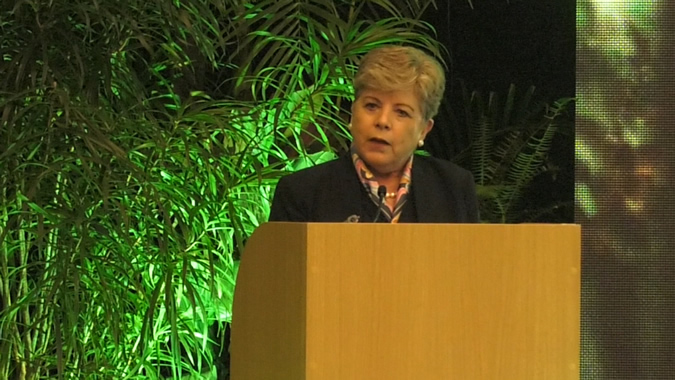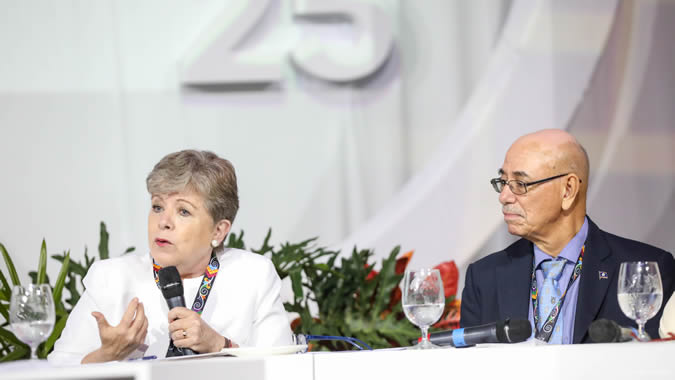ECLAC Calls for Deepening Regional Cooperation and Achieving a Truly Collective and Simultaneous Commitment to Addressing the Climate Emergency, at the PRE COP 25’s Closing Session
Work area(s)
At the conference’s closing session, Alicia Bárcena, Executive Secretary of the United Nations regional commission, recognized Costa Rica for its decarbonization plan and its emphasis on nature-based solutions.

The Executive Secretary of the Economic Commission for Latin America and the Caribbean (ECLAC), Alicia Bárcena, called on the region’s countries to deepen regional cooperation and achieve a truly collective and simultaneous commitment to addressing the climate emergency, at the closing session of the preparatory meeting for the Conference of the Parties, PRE COP 25, which concluded today in San José, Costa Rica.
The senior United Nations representative called for moving towards a new cooperation paradigm that integrates less asymmetrical schemes for financing and technology transfer between industrialized countries and developing countries, and that takes into account the gaps that need closing in middle-income countries.
In her remarks, Alicia Bárcena sustained that there is a need for cooperation that addresses the international asymmetry between emissions and vulnerability. She also called for implementing actions aimed at energy efficiency, such as rationing or gradually eliminating subsidies for fossil fuels without punishing poor households.
Furthermore, she urged Latin American and Caribbean countries to prioritize investment in adaptation, particularly in the Caribbean, where much of the population lives below the mark of 5 meters below sea level, and in Central America, which is subjected to intensified and systematic climate variability that affects small growers of coffee, corn and other products, and which has become one of the structural causes of migration.
The leading representative of the United Nations regional commission added that adaptation offers opportunities to reduce the future negative impacts of climate change while also energizing the region’s economies with resilient infrastructure, electromobility, protection of mangroves and sustainable fishing.
She warned that the PRE COP demonstrated that, as of now, the sum of the Nationally Determined Contributions (NDCs) will not be enough to achieve the Paris Agreement’s objective of averting a temperature increase of more than 2 degrees Celsius. That is why a truly collective and simultaneous commitment is so important.
ECLAC’s Executive Secretary publicly recognized Costa Rica and its commitment to decarbonizing by 2050, “which shows that it is possible to put the economy at the service of the collective welfare and environmental protection.”
She also highlighted the importance of the meeting between environmental and energy authorities from Central America, who gathered in the framework of the PRE COP under the auspices of the Central American Integration System (SICA).
Furthermore, she noted that “this PRE COP has had a human face, the face of women, youth, indigenous peoples.” She also stressed the importance of the Regional Agreement on Access to Information, Public Participation and Justice in Environmental Matters in Latin America and the Caribbean, better known as the Escazú Agreement, which she described as “an instrument that provides citizens with a legal platform for exercising their rights.”
“We mustn’t forget that there are forces that seek to halt change, that benefit from the unequal or carbonized world we know, and that threaten those who defend the environment, oftentimes women leaders in vulnerable communities. It is our duty to protect them and never forget the human face of those affected by the impacts of climate change,” she stated.
Earlier in the day, Alicia Bárcena spoke at the inauguration of EUROCLIMA’s Annual Gathering, where she emphasized the commitment of Latin America and the Caribbean and Europe to tackling the climate emergency.
In the framework of the PRE COP 25, Alicia Bárcena spoke at the conference’s opening session, which took place on Tuesday, October 8. She also participated in other activities, including panels on gender equality and climate change, and on strengthening the partnership between the European Union and Latin America for greater climate ambition, organized by EUROCLIMA+; and a high-level event on mobilizing finance for a low-emission transition, organized by the Organization for Economic Cooperation and Development (OECD).
Related content

ECLAC Reaffirms at PRE COP 25 the Urgency of Moving Towards a New Development Paradigm that Allows for Preserving Economic, Social and Environmental Heritage
Alicia Bárcena, Executive Secretary of the United Nations regional commission, participated in the opening session of the preparatory meeting for the Conference of the Parties, being held in Costa…
Country(ies)
- Latin America and the Caribbean
Contact
Public Information Unit
- prensa@cepal.org
- (56 2) 2210 2040